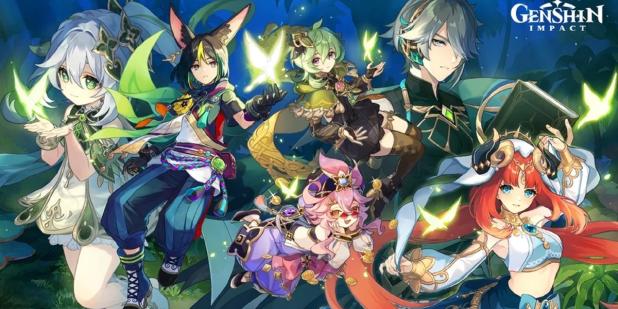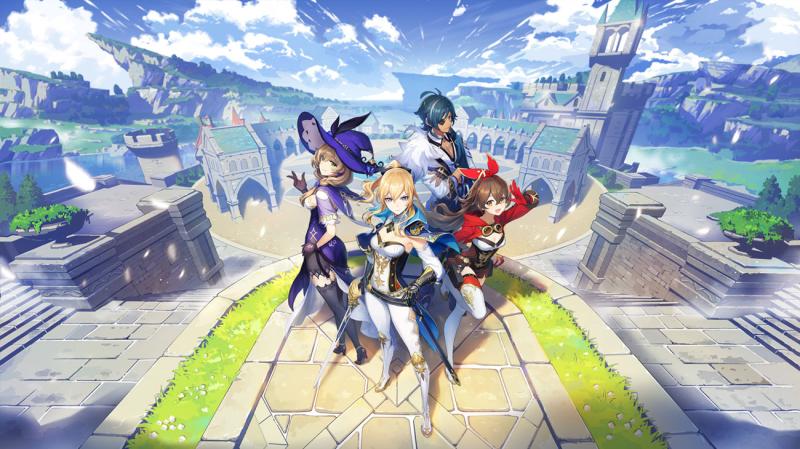Join us for a free one-day workshop for educators at the Japanese American National Museum, hosted by the USC U.S.-China Institute and the National Consortium for Teaching about Asia. This workshop will include a guided tour of the beloved exhibition Common Ground: The Heart of Community, slated to close permanently in January 2025. Following the tour, learn strategies for engaging students in the primary source artifacts, images, and documents found in JANM’s vast collection and discover classroom-ready resources to support teaching and learning about the Japanese American experience.
Genshin's Global Impact

Genshin Impact, a Chinese video game developed by miHoYo, was released in late 2020 and has shattered revenue records. It reflects and accelerates a major shift in the global gaming industry. Video game revenues, estimated at $183 billion in 2022, dwarf all other entertainment. Genshin Impact is a break out hit and was designed for mobile platforms first. Almost 700 million people in China play mobile games and more and more people beyond China have embraced gaming on their phones. It's not uncommon for smartphone reviews to include mention of how well the device supports Genshin Impact. Companies which focused on computer and console-based games recognize the need to strengthen their mobile offerings. It's one of the reasons why Microsoft has been doggedly pursuing its $69 billion acquisition of Activision Blizzard, a company where mobile revenues now top their well-established PC and console offerings.
Genshin Impact's allure extends far beyond its gameplay. The game has fostered a thriving and dynamic global online community. Players come together on platforms like Discord to form their own communities. Members are linked by their passion for the game. These communities are known for their camaraderie and willingness to cooperate. The spirit of collaboration extends beyond the virtual world, with players organizing activities and events that further strengthen the bonds between members. From giveaways to movie nights featuring popular titles like Among Us, Genshin Impact's online community has become a space for players to connect, share experiences, and forge lasting friendships. Genshin Impact's impact on the gaming world cannot be overstated. With over 66 million monthly players as of August 2023, the game has firmly established itself as a global phenomenon. Its frequent updates and events continue to draw in new players, keeping the community engaged and enthusiastic. On platforms like Twitch, live streamers provide insights and updates, creating anticipation for events like the Genshin Impact 4.0 livestream. As the universe of gaming grows, this level of community engagement sets a new standard. The economic returns for getting players so involved on devices they carry with them are obvious.

Genshin Impact's popularity helped renew concern about the time players spend on their devices. Many players find the game so captivating that they or their families worry about it becoming a distraction. In response to these concerns, China's government reduced the time minors can play video games. Rules set up in 2019 allowed them 90 minutes a day during the week and three hours a day on weekends. In 2021 the limit was tightened to no more than an hour a day. Companies are required to enforce these rules. This month cell phone companies were directed to set up "minor modes" their phones, this limits their usability between 10 pm and 6 am.
Genshin Impact has also attracted more female players than many other games. In China 55% of the players are male and 45% female. Genshin Impact shows more inclusive games can be more profitable.
While Genshin Impact has flourished, Steam, a leading PC game distribution platform, faces challenges in mainland China. The platform, which has been an essential portal for international developers to access Chinese gamers, is facing increasing restrictions. The blacklisting of Steam's main website, the need for VPN access, and unreliable connections have hindered the gaming experience for Chinese players. This situation has not only impacted gamers but also developers, potentially leading to a significant loss in sales -- and exchange across borders. It highlights how difficult it can be to navigate China's market, even for well-established firms.
As the largest video game market, China profoundly influences industry trends. Chinese firms such as Tencent and NetEase publish some of the most popular games and dominate the global esports market. NetEase's decision to drop its longstanding partnership with ActivisionBlizzard at the start of this year upset Chinese gamers suddenly cut-off from World of Warcraft, one of the earliest and most successful global games.
While gaming itself has reached new heights, the act of watching others play has also become a significant industry. Here, too, China has the largest market with livestreamed contests on many platforms. The rise of esports has attracted companies such as the Cinemark movie chain to launch an esports league.
Tencent, owner of WeChat (微信) China's everything app, creates its own games through TiMi and partners with foreign developers to bring games such as Call of Duty into China. It owns Los Angeles-based RiotGames. Along with NetEase and other private firms, Tencent has coped with increased scrutiny and regulation from the Chinese government. After a long period when game approvals were few, in late 2022 China's government began giving Tencent and other companies permission to launch a number of games, including some with foreign partners.
The deep engagement video games can nurture and the huge heft of the most dominant players has regulators in Beijing, Washington and other capitals paying attention. China controls what games can be legally offered in the country and now seeks to limit playing time for young people. The U.S. and U.K. have not yet blessed Microsoft's megapurchase, though it won European Commission approval.
USCI has long monitored video games in China and will continue to do so. Please see some of our resources below.
Shaping the Future of Chinese Gaming

Genshin Impact won the Players Voice award at the 2022 Game Awards, the Academy Awards of video games. USC students praised its cross-platform playability, especially on mobile devices. Some questioned its originality and complained about China's strict gaming regulations, others highlighted its incorporation of Chinese culture as a smart strategic move, garnering government approval and resonating with Chinese players' cultural identity. Read more about Genshin Impact’s domination in Martin Li’s US-China Today article here.
The featured photo above is key art from Genshin Impact.
RESOURCES
USCI hosted leading video games analyst Lisa Hanson in 2018. Lisa leads NikoPartners. We look forward to having her back with us later this fall. The USC U.S.-China Institute focused on video games consumption in this newsletter and the esports industry here. USC alum Jenova Chen has been a pioneering video game developer. He was already an industry leader in 2012. Watch his presentation on how as a schoolchild in China, he began fascinated with games.
Here are other US-China Today articles on the evolution of China’s video game industry and e-sports in China.
CORRECTION: This article was corrected to stress that minor mode on phones limits all phone use and not just gameplay. We regret the error.
Click here to subscribe to the USCI newsletter. It includes information about upcoming events, professional development opportunities, and quick looks at important issues in U.S.-China relations and trends in contemporary China. Previous issues are available here.
Featured Articles
Please join us for the Grad Mixer! Hosted by USC Annenberg Office of International Affairs, Enjoy food, drink and conversation with fellow students across USC Annenberg. Graduate students from any field are welcome to join, so it is a great opportunity to meet fellow students with IR/foreign policy-related research topics and interests.
RSVP link: https://forms.gle/1zer188RE9dCS6Ho6
Events
Hosted by USC Annenberg Office of International Affairs, enjoy food, drink and conversation with fellow international students.
Join us for an in-person conversation on Thursday, November 7th at 4pm with author David M. Lampton as he discusses his new book, Living U.S.-China Relations: From Cold War to Cold War. The book examines the history of U.S.-China relations across eight U.S. presidential administrations.




